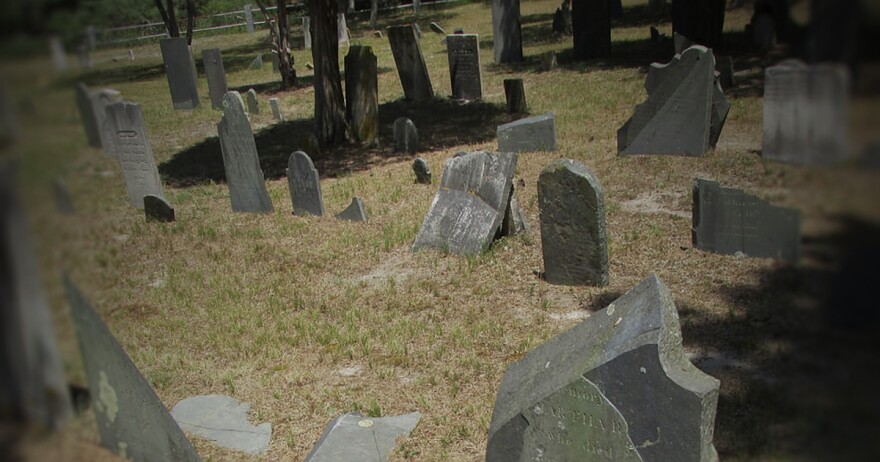The other day I stopped for a dip cone at P.J.’s on Route 6 in Wellfleet. As is my habit, I took the cone and walked across the road up into the Duck Creek Cemetery, the old Congregational graveyard where most of the headstones are from the late 18th and early 19th centuries. I’m never sure whether the cone is the excuse for walking into the cemetery or the cemetery is the excuse for buying a cone, but it always seems a nice combination. As I walked through uncut stands of dandelions, their long, slender, curved stems tugged at the cuffs of my pants like the gentle fingers of the dead.
The graves here are shaded by pitch pines and locusts, trees that give the impression of appropriate antiquity, though both are pioneer species, and thus indicators of a young forest. As I sauntered along the undulating, grassy slopes I came upon at least a dozen piles of broken gravestones, both slate and marble, laid out on wooden pallets and wrapped in police tapes. This, I assumed, was a gravestone restoration project being undertaken by the town, which has taken over maintenance of these once-private, now-historic cemeteries. Several of the broken headstones had been cemented or epoxied back together. Some had already been remounted in new concrete bases that will hopefully be resistant to frost heaves.
I spotted one such restored stone belonging to a “Mr. Elijah Jones.” It caught my eye because the death date was 1791, but the stone was decorated with the characteristic 19th century symbols of an urn and a weeping willow. The headstone had been restored, though the eroded epitaph had not, so that it took me a while to make out the legend. When I did, I was struck again by how these reticent gravestones, listing only the bare facts of their inhabitants, are so eloquent in what is not said. In addition to Mr. Jones, who died at the age of 38, it listed “also 2 sons/ Elijah Jr., who died at Amsterdam/ December 25, 1797, / Aged 18,” and “Benj. who died off Point Patte [wherever that is], May 10, 1802/ Aged 16.” Two teenage sons, both likely drowned, one on Christmas Day, buried overseas, far from home. And we think we have it hard.
Some of the piles of broken tombstones contained a dozen or more pieces, with several of them missing, like an incomplete jig-saw puzzle, or an ancient, partial hieroglyph – so that they spoke only in fragments: "Mrs. Sarah"… "In sacred"… "Native of Bucksport, Maine…" In truth, it looked more like an archaeological dig than an historic restoration.
Why, I wondered, do we go to such measures to keep the dead alive – or at least to keep their names and mortal statistics intact – long after whatever messages they left for us have been dissolved and disintegrated by rain, frost, and lichen? Few of us living now in this town can claim these stones as their ancestors’. Is it just to keep some connection with the past, even if it’s only a borrowed one? Or is it that by resurrecting these stones – a small, secular resurrection, to be sure – we may feel that we are somehow helping these departed souls to keep alive, as The Book of Common Prayer puts it, “the sure and certain hope of the Resurrection to eternal life.”







